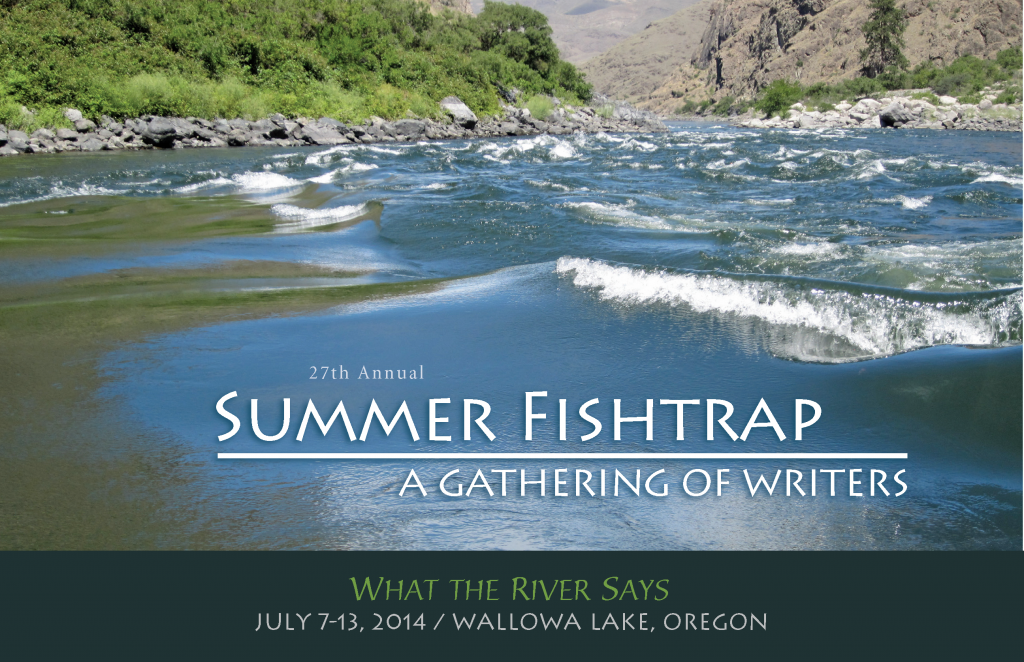Stories and Specialty
I just spent four days in the company of poets and writers. Well-published storytellers like Naomi Shihab Nye, Luis Urrea, Kim Stafford, Teresa Jordan, Gary Ferguson — and hundreds more, published and not. No matter the notoriety, each one wove images into stories — tales to entertain, to instruct, to push beyond whatever bounds any of us imagines.
All week these stories echoed across the wide meadow in the northeastern corner of Oregon — the meadow stretching above Wallowa Lake, a generous bowl of water held up by the Wallowa Mountain Range — the meadow perfectly suited to welcome, every summer, the Fish Trap Gathering of Writers.
To be around storytellers is to remember.
It is to remember the mystery in common things, and the common in what glitters or snarls at the far edges. It is to remember the spectral climates of emotion that shift and change around bends, on straight-aways, no matter one’s path through the space and time.
Stories carry the reminder that words are like paints. Storytellers apply those paints to the canvass that is the space between words and the eyes of the reader, the ears of the listener.
Every story is new, and each time a story is told it is different. This is a variation that may not be avoided because, like any attempt to step in the same river twice, no story can be told in circumstances other than those of the moment of its telling.
I am pretty sure the things stories help me remember are different from things they bring back to other people. But I’m more sure stories can’t help but remind — they can’t help but teach, inspire, show us where to find the things we need.
The day I returned to my usual life – once again whimsically unsure what exactly usual means – I received email from a business colleague. He was letting me know that a book of stories I had suggested for consideration by a professional organization as their next Shared Read, was “interesting, but of no relevance to the profession.” I believe him. I believe that this accomplished businessman and many of his colleagues have learned to see relevance only in writing that speaks with direct authority to matters of profit and the variables supporting it. Some of that writing is good — it is helpful.
Still, I wonder what is missing with that narrowed reading selection. Every story I heard in the green shadows of the Wallowa Mountains was rich with guidance — for anyone, really — but especially for leaders. You see what you think.
Here are a few quotes from the more well-known storytellers I mentioned above. What might be here for leaders in the professions of our planet’s formal economies?
“Today you will say things you can predict and other things you could never imagine this minute. Don’t reject them, let them come through when they’re ready, don’t think you can plan it al out. This day will never, no matter how long you live, happen again. It is exquisitely singular. It will never again be exactly repeated.”
― Naomi Shihab Nye
“Words are the only bread we can really share.”
― Luis Alberto Urrea
“This didn’t have to be a big book about an impossibly weighty topic—it could be 100 little stories, in bite-sized pieces. This is the same way we teach. We teach many little lessons; there’s not one big lesson and then you’re educated.”
— Kim Stafford
“I once ran across a list of nearly 400 winds from around the world and wondered why Wyoming, so dominated by wind, has so few names for its variations…. There’s the wind, the damned wind and the goddamned wind.”
― Teresa Jordan
“There was a time and place where, when people got confused, they went to the storyteller. And sitting down eye to eye, she wove a tail with just enough holes in it for the listener to be able slip her life inside, and make it her own.”
—Gary Ferguson
 Clare Consultation, LLC
Clare Consultation, LLC